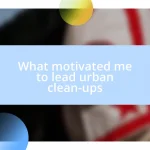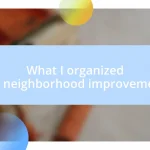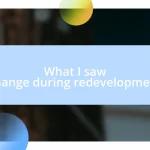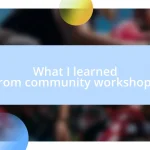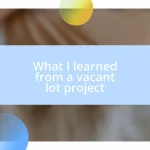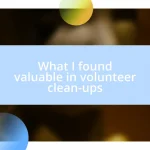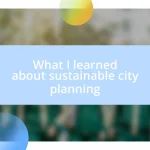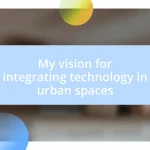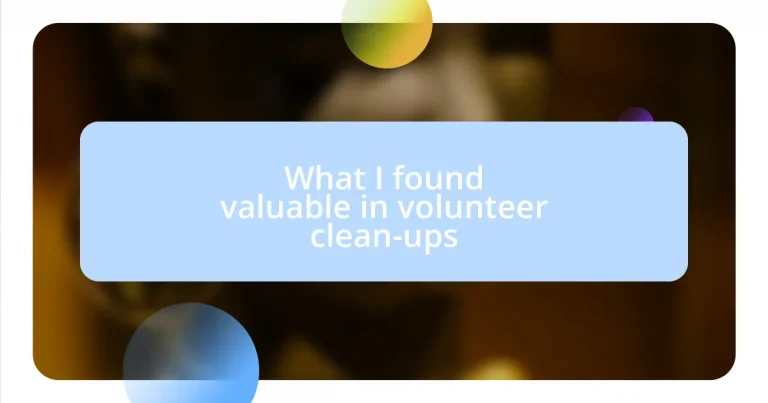Key takeaways:
- Volunteer clean-ups foster a sense of community, bringing together diverse individuals to work towards a common goal and create immediate positive impacts in local environments.
- Participation develops valuable skills, including leadership, communication, teamwork, problem-solving, and time management, enhancing personal growth and boosting confidence.
- Engaging in clean-ups not only revitalizes spaces but also sparks important conversations about environmental stewardship, fostering a deeper appreciation for community history and responsibility towards shared spaces.
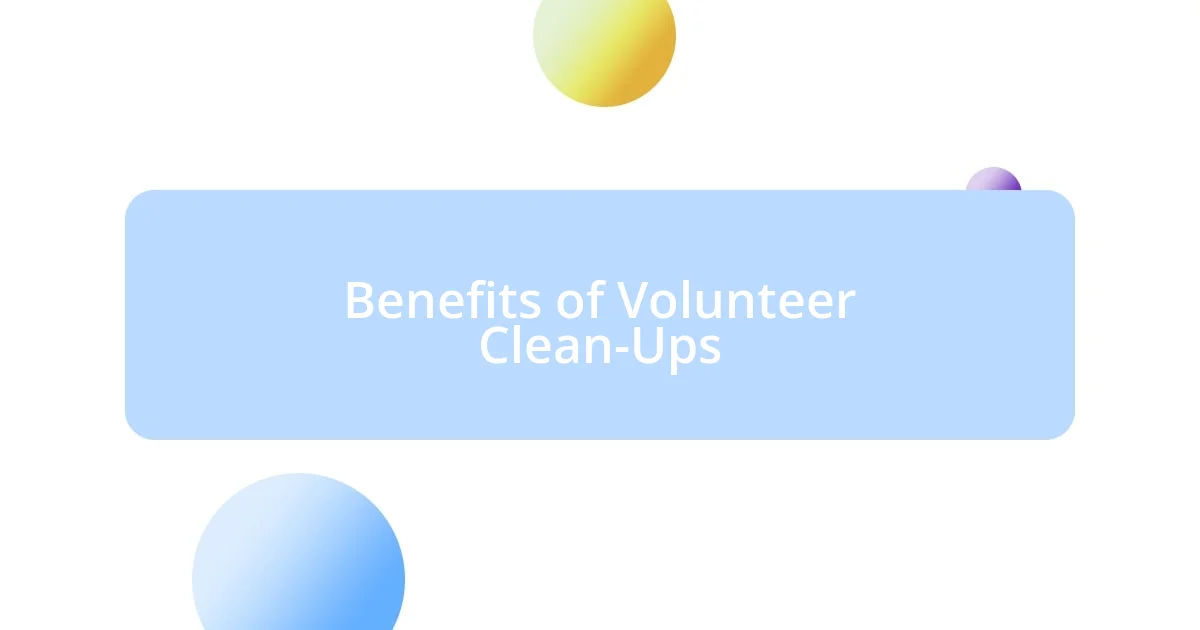
Benefits of Volunteer Clean-Ups
One undeniable benefit of volunteer clean-ups is the sense of community they foster. I remember my first clean-up event; it was amazing to see people from different walks of life coming together for a shared purpose. Have you ever felt that electric buzz of camaraderie when a group of strangers starts working side by side? It’s a powerful reminder that we can all contribute to something greater than ourselves.
Participating in these clean-ups also instills a profound sense of accomplishment. There’s something incredibly rewarding about transforming a littered area into a pristine space, isn’t there? After a recent clean-up at a local park, I couldn’t help but smile when I saw families enjoying the space we had revitalized. It made me realize how tangible our efforts can be and how they create immediate positive impacts for the community.
Moreover, volunteer clean-ups offer an opportunity for personal growth and education. Each time I joined a clean-up, I found myself learning more about environmental issues and sustainable practices. Have you ever stopped to think about the small changes we can make in our daily lives to support such efforts? Engaging in these activities has inspired me to be more mindful of my own habits, and I believe it can inspire you, too.
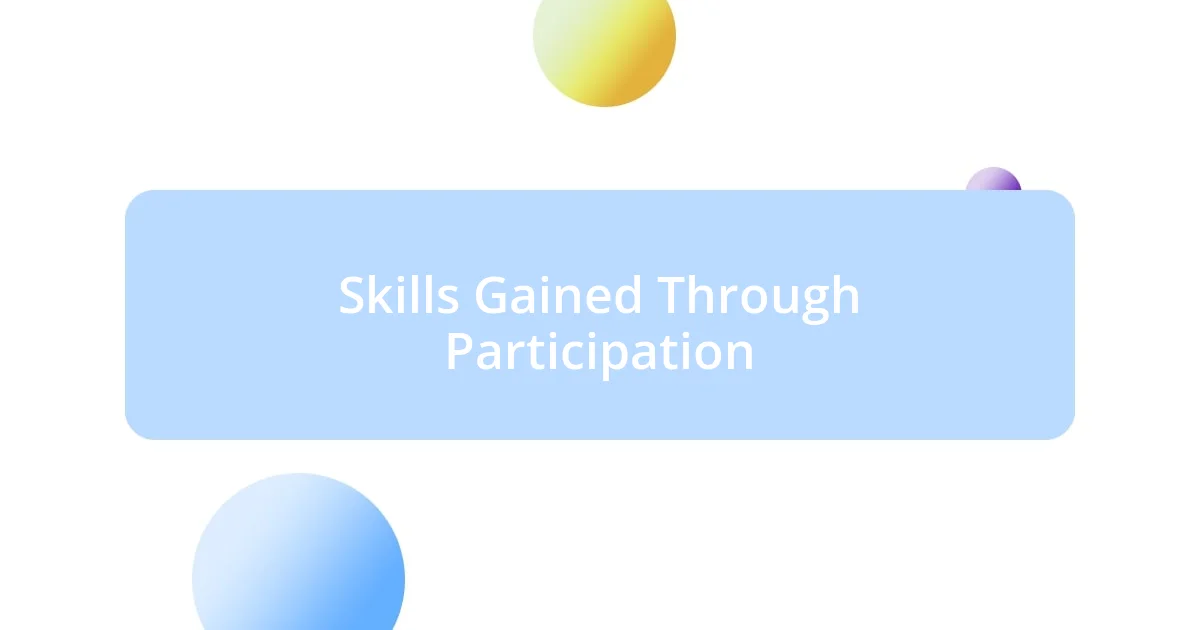
Skills Gained Through Participation
Participating in volunteer clean-ups has taught me a range of valuable skills. One time, I was tasked with coordinating a group of volunteers, and I quickly realized the importance of leadership and teamwork. I found myself navigating different personalities and skill levels, which sharpened my communication skills significantly. It was an enlightening experience to see how collaboration turned a messy situation into a productive one.
Skills gained through participation include:
- Leadership: Taking charge in organizing and motivating the group.
- Communication: Effectively sharing instructions and ideas.
- Teamwork: Working alongside diverse individuals towards a common goal.
- Problem-solving: Finding creative solutions to unexpected challenges.
- Time management: Juggling various tasks to complete the clean-up efficiently.
I recall another clean-up where I discovered an unexpected knack for planning logistics. I had to arrange the collection points for the trash to ensure a smooth workflow. It was like solving a puzzle! The ability to think strategically while still being hands-on was a skill I didn’t realize I had. Such experiences not only boost confidence but also equip you with practical abilities for future endeavors.
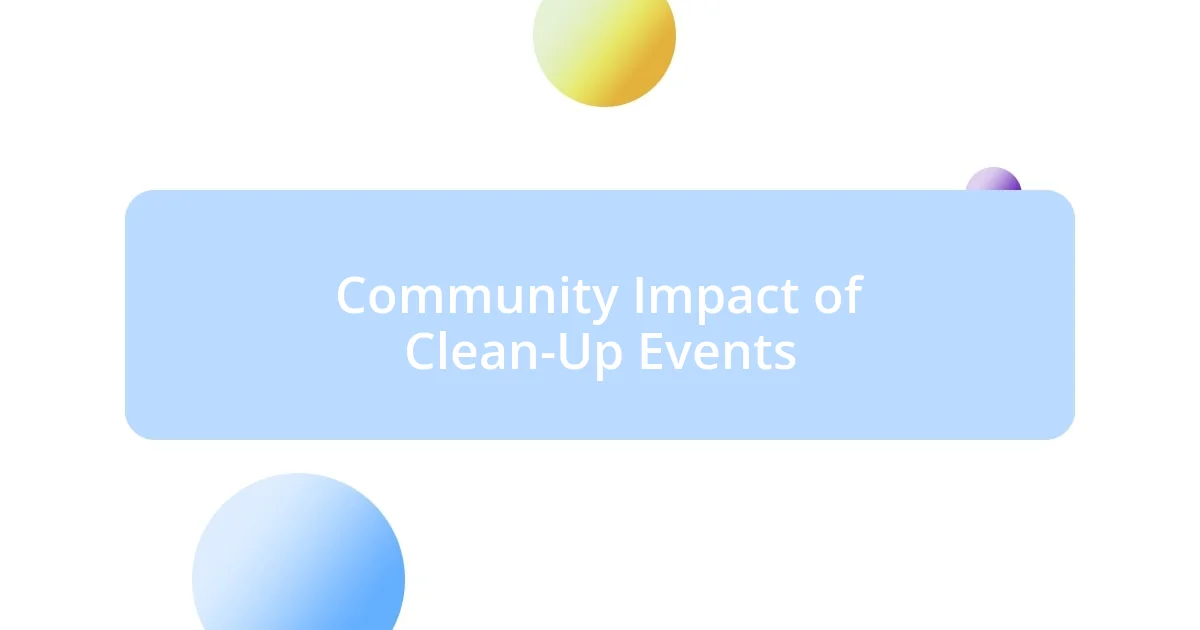
Community Impact of Clean-Up Events
Community clean-up events create a ripple effect of positive change in local neighborhoods. I vividly recall a day when we transformed a neglected waterfront into a welcoming spot for the community. As we pulled out bags of trash, I saw children laughing and families setting down picnic blankets. That visual made me understand how revitalized spaces can rekindle joy and pride in the community. It’s astonishing how a little effort can breathe new life into our surroundings.
The engagement these events foster extends beyond just cleaning; they foster a sense of ownership among residents. I once spoke with a long-time resident who shared how clean-up events had ignited a conversation about better waste management within our community. It was a moment of revelation for me; our hands-on efforts not only cleaned the environment but also sparked important dialogues that inspired lasting change. I learned that community impact goes hand in hand with raising awareness about our responsibility towards our shared environment.
Moreover, volunteer clean-ups often unite people who may never have crossed paths otherwise. In one particular event, I teamed up with a local artist who shared her vision for public art installations to beautify parks. By combining our ideas, we created an enriching experience, blending aesthetics with environmental stewardship. This collaboration highlighted how community involvement can unleash creative potential and strengthen local bonds, creating a more vibrant and interconnected community.
| Positive Aspect | Community Impact |
|---|---|
| Environmental Restoration | Clean areas promote health and well-being. |
| Community Engagement | Brings together diverse individuals for collaborative efforts. |
| Awareness Raising | Encourages discussions on sustainability and responsible habits. |
| Support for Local Initiatives | Leads to community-led projects and improvements. |
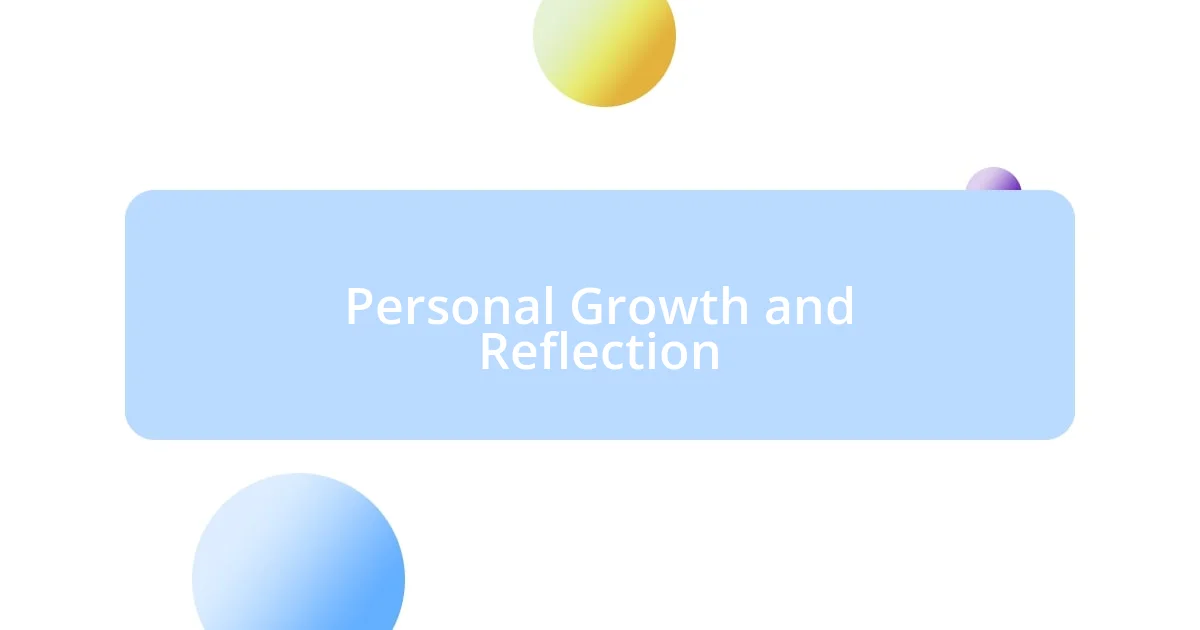
Personal Growth and Reflection
Engaging in volunteer clean-ups has been a profound journey of personal growth for me. One particular day stands out; amid the hustle of picking up litter, I found myself deep in thought about the impact of our small actions. It made me realize how often I take for granted the beauty of my surroundings. Have you ever stopped to think about what it truly means to care for your environment? That day, the act of picking up trash became a form of meditation, prompting me to reflect on my role in preserving the planet.
Involvement in these clean-ups has pushed me beyond my comfort zone, confronting not just physical challenges but also internal barriers. There was a moment when I hesitated to lead a discussion among volunteers. I felt the familiar pang of self-doubt creeping in. Yet, as I shared my ideas, I could see others nodding in agreement, and it dawned on me that my voice mattered. These realizations came with a sense of pride and accomplishment. Isn’t it remarkable how stepping up sometimes leads us to discover strengths we never knew we had?
As I grew more involved, I began to appreciate the power of reflection. After every clean-up, I took moments to jot down my thoughts and feelings, noticing how gratitude became a recurring theme. The simple act of returning to a cleaner environment felt rewarding. I often ask myself, how can we cultivate gratitude in our daily lives? Such reflections not only transformed my perspective on environmentalism but also enriched my interactions with others, fostering deeper connections based on shared values and responsibilities.
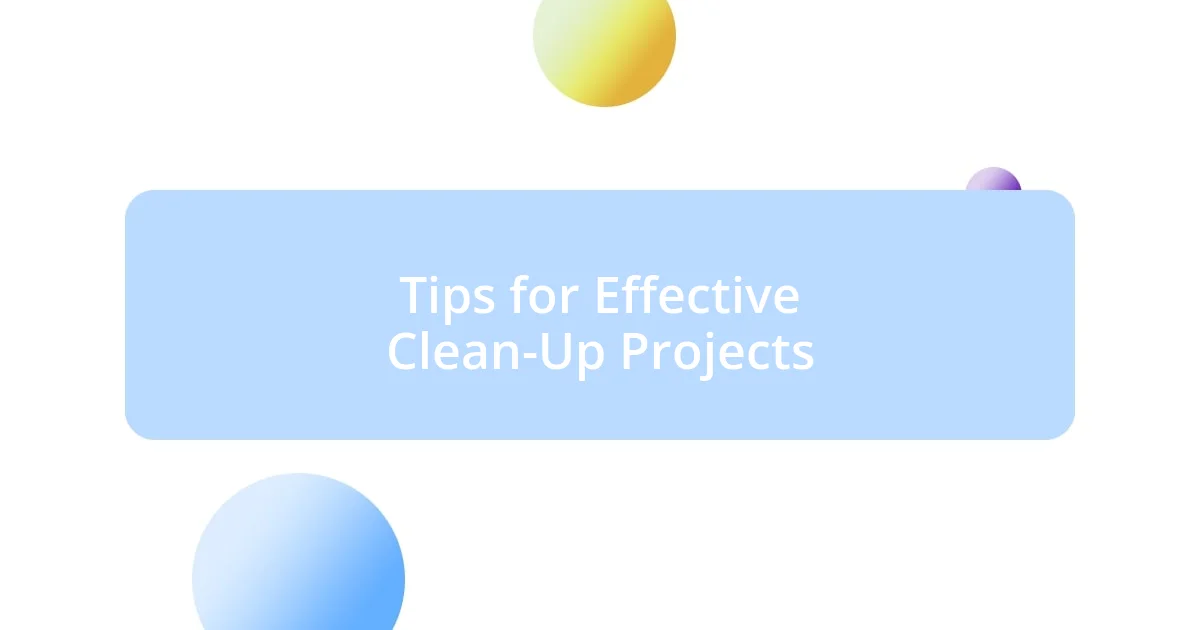
Tips for Effective Clean-Up Projects
When organizing clean-up projects, preparation is key. I found that gathering the right supplies—gloves, bags, and grabbers—makes a world of difference. The first time I forget to bring enough trash bags, it felt like a scramble. Trust me; having everything ready in advance can smooth the flow of the day, allowing us to focus on making an impact rather than running around in search of essentials.
Engaging volunteers requires a personal touch. I remember reaching out to local schools and clubs to invite them to participate. By sharing my passion for the project and explaining how it could benefit our community, I noticed a significant increase in volunteer turnout. Don’t you think people are more likely to join if they feel a sense of connection and purpose? Personal stories about past clean-ups resonate, igniting enthusiasm and building a shared commitment to the cause.
Lastly, celebrating small wins truly enhances the experience. After a successful clean-up, I once organized a casual picnic for volunteers to unwind and reflect on our collective achievements. Watching everyone relax and share their stories about the day created a genuine bond. Isn’t it amazing how a simple celebration can strengthen community ties? Making time to appreciate our efforts can inspire participants to return, fostering a cycle of positive engagement and friendship.
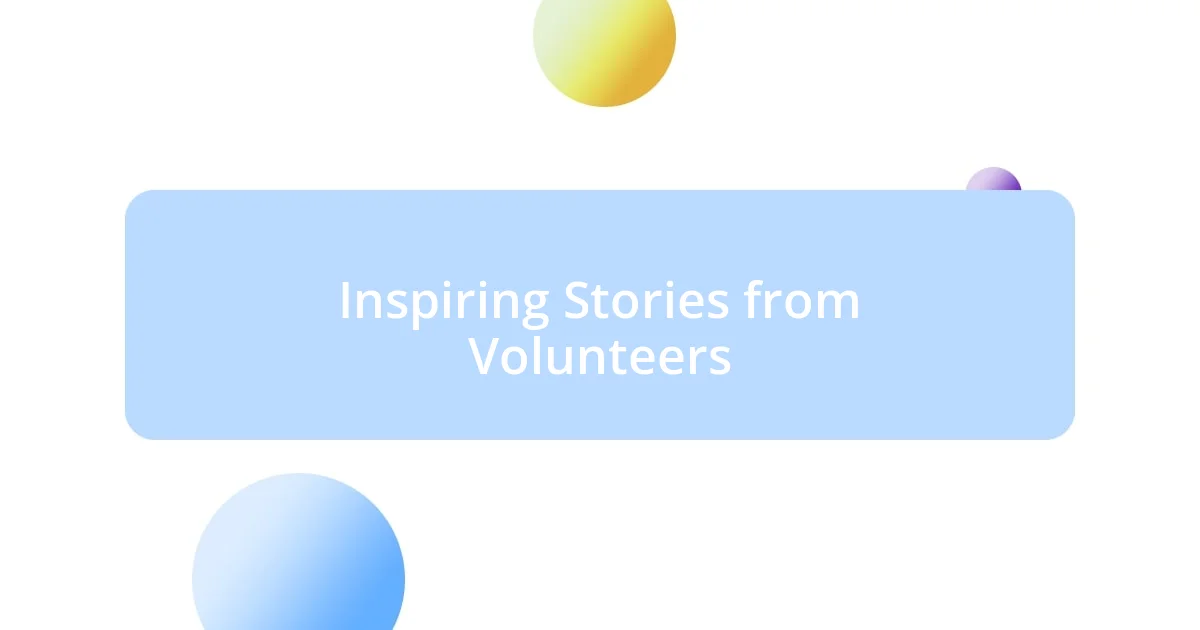
Inspiring Stories from Volunteers
It’s incredible how volunteer clean-ups can foster connections among people from all walks of life. I vividly remember a day when a quiet teenager named Mia surprised everyone with her enthusiasm; she transformed from an observer into a leader, rallying the team to tackle the most littered area of the park. Witnessing her newfound confidence was truly inspiring—have you ever seen someone bloom right before your eyes? That moment taught me how collective action can ignite self-discovery and empowerment in unexpected ways.
During one clean-up, we stumbled across an old mural nearly hidden under layers of trash. As we carefully cleared the debris, a neighborhood resident approached us, her eyes glistening with nostalgia as she recounted how the mural represented hope for the community. Engaging in that conversation made me realize the emotional weight of our mission—it wasn’t just about picking up litter but restoring pride in our shared spaces. How often do we forget the stories intertwined with our environment? This experience deepened my appreciation for community history and strengthened my commitment to preserving it.
One particular Saturday morning, we coordinated a clean-up at a local beach. I’ll never forget when a group of younger volunteers, inspired by their parents’ enthusiasm, started a friendly competition to see who could collect the most trash. Their laughter echoed against the waves, creating an atmosphere of joy amidst hard work. It made me reflect on how these moments can plant seeds of environmental stewardship in young minds. Isn’t it wonderful to consider the impact of instilling responsibility in the next generation? Each of these stories acts as a testament to how meaningful connections and shared experiences can transform not just our environments, but also the people within them.
